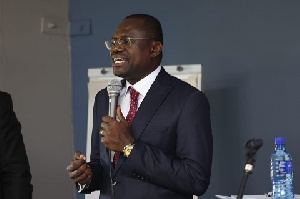The Ghana Center for Democratic Development (CDD-Ghana) has released more results of its Afrobarometer Round 5 Survey at the Center’s auditorium.
The second batch of findings which focused on “Governmental Accountability and Responsiveness” raked up some very interesting findings, just like the findings on the social and economic conditions of Ghanaians which was released a few weeks ago.
Presenting the findings to the media and representatives of civil society, Mr. Edward Ampratwum, a Research Officer of the Center said 58% of respondents perceive officials at the presidency as corrupt, and the same percentage perceive Members of Parliament as corrupt while a slightly lower percentage, 56% perceive the government as corrupt.
Mr. Ampratwum said an overwhelming majority of respondents, 96% perceive “most” or “all” tax officials (40%) and the Police 56% as corrupt. Nearly a tenth said they offered a bribe to procure water, sanitation, health service or a school placement for their wards.
Although 68% support the media’s exposure of official corruption and government mistakes, a large minority (43%) endorse government control over media practice.
In a panel discussion after the presentation, Prof. Audrey Gadzekpo, a lecturer at the School of Communication Studies, the University of Ghana, observed that the perception by 43% of respondents for the media to be controlled could be attributed to the impression that public confidence is declining in media freedom.
She said the media may be overstepping its professional limits in some cases. Prof, Gadzekpo said the findings should provoke debate among the media on how to apply professional standards to their work.
Other panelists were Mr. Franklin Cudjoe, CEO of Imani Ghana and Florence Denis of the Ghana Anti- Corruption Coalition, (GACC).
The Afrobarometer is a comparative series of public opinion polls that measure public attitudes towards democracy, governance, the economy, leadership and other development issues. The current round of surveys is targeting about 35 African countries.
General News of Thursday, 13 September 2012
Source: radioxyzonline












